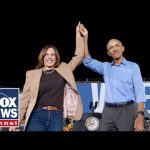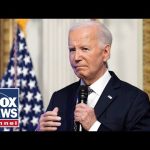The United States faces mounting challenges in the realms of international trade and security, with China and the Middle East at the forefront of these issues. Recent discussions have emphasized the urgent need for America to assert its economic and geopolitical dominance, particularly in light of China’s aggressive trade practices and Iran’s destabilizing influence in the Middle East. These concerns underscore the necessity for decisive action to protect American interests and ensure a level playing field in global affairs.
China’s trade policies remain a significant point of contention. As the world’s largest tariff barrier country, China has long exploited unfair practices, including intellectual property theft, forced technology transfers, and state subsidies that disadvantage American businesses. The Trump administration’s recent tariff measures aim to address these inequities by closing loopholes that have allowed Chinese goods to flood U.S. markets without proper taxation. These actions are not just about economics—they are about safeguarding national security by reducing reliance on a nation that has consistently undermined fair trade principles. While some critics warn of short-term market disruptions, the long-term benefits of restoring American manufacturing and economic independence cannot be overstated.
In addition to trade concerns, China’s growing influence in the Middle East poses a strategic challenge. Beijing has expanded its economic footprint through initiatives like the Belt and Road Initiative while positioning itself as a mediator in regional conflicts. However, China’s involvement often prioritizes its own economic interests over genuine stability, as seen in its reliance on energy imports from volatile regions like the Persian Gulf. The U.S., as a longstanding security guarantor in the Middle East, must counterbalance China’s ambitions by reinforcing alliances and ensuring that regional partners remain aligned with American interests rather than succumbing to Beijing’s overtures.
Meanwhile, Iran continues to be a destabilizing force in the Middle East through its support of proxy groups like the Houthis in Yemen and Hezbollah in Lebanon. These proxies not only threaten regional stability but also pose direct risks to U.S. allies and interests. Recent reports of Iranian arms shipments to the Houthis and heightened military activity underscore Tehran’s intent to project power and challenge American influence. President Trump’s administration has taken a firm stance against Iran’s aggression, signaling that any attacks on U.S. forces or allies will be met with decisive action. This posture is critical for deterring further provocations and maintaining order in a region vital to global energy supplies.
On the security front, America’s NATO allies must also shoulder more responsibility for collective defense. The disproportionate financial burden borne by the U.S. has long been a point of contention, particularly as threats from Russia and Iran grow more pronounced. Strengthening NATO requires European nations to increase their defense spending and actively contribute to joint security initiatives. A robust NATO is essential for countering adversaries like Russia, whose actions in Ukraine and elsewhere threaten Western unity.
In conclusion, America’s challenges with China and the Middle East are interconnected issues that demand strong leadership and strategic vision. By addressing unfair trade practices, countering China’s regional ambitions, deterring Iranian aggression, and reinforcing alliances like NATO, the United States can reclaim its position as a global leader. These efforts are not just about protecting American jobs or securing borders—they are about ensuring that America’s values and interests shape the future of international relations in an increasingly competitive world.




